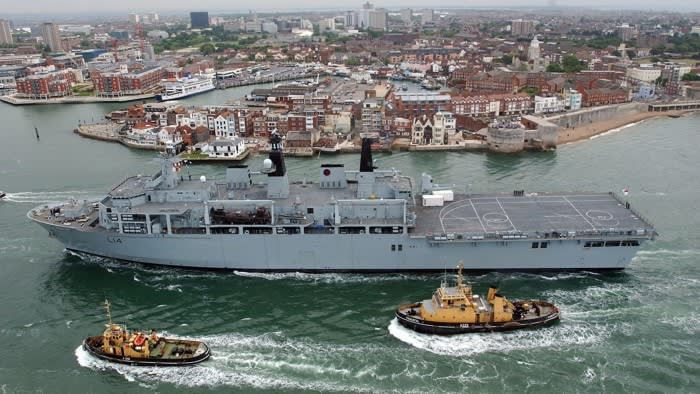Rishi Sunak expected to unveil new UK warship programme

Keep yourself knowledgeable with costless notifications.
All you have to do is register for the Aerospace & Defence myFT Digest and receive it straight to your email.
Rishi Sunak is getting ready to unveil a fresh plan for warship production, as he is being urged by Conservative MPs to commit to increasing national defense expenditure to 2.5% of the GDP within a set timeframe.
Sources report that the British leader is likely to continue with the proposal for additional multi-functional support vessels in the coming month. These ships will be instrumental in strengthening the UK’s capacity to undertake amphibious warfare operations.
The country's plan for shipbuilding, which was previously revised two years ago, outlined proposals for a solitary variety of multi-purpose assistance vessels coming into operation in the early 2030s. This ship would replace the present range of amphibious vessels, which include a mixture of warship and subsidiary vessels, one of which is the Royal Navy's landing platform docks, specifically the HMS Albion and the HMS Bulwark.
The government has not yet approved the new funding for the announcement, as officials have warned. The way in which the procurement will be managed and whether it will be opened up to competition among British shipbuilders has not been determined. At present, ships for the navy are only constructed in the United Kingdom. Based on what insiders have said, the new plan would probably involve building two sets of three warships.
A possible announcement is expected since Conservative Members of Parliament are launching a new campaign to persuade Sunak to promise an increase in defence expenditure.
The head of the government announced his plan to boost the budget for defense to 2.5% of the nation's income "when the economic situation permits." This goal was also echoed by Sir Keir Starmer last week.
The head of the Labour party has worked hard to establish the party's credibility in matters relating to defense after the previous leadership of Jeremy Corbyn, where doubts were raised about Labour's stance on the nuclear deterrent and Nato. Recent surveys indicate that the British public now has greater faith in Labour's ability to handle defense issues as compared to the Conservative party.
Ex-Tory cabinet member Sir Simon Clarke has expressed his belief that in these uncertain times, it is imperative that there is a clear and resolute plan in place outlining how the government plans to increase their defence spending to 2.5% of GDP over the course of the next parliamentary term.
According to him, the Conservatives have always been identified with defence as a political party, but presently, it is becoming hard to believe this.
The government at Downing Street has started a sequence of panels with Conservative Members of Parliament to talk about possible proposals for their manifesto. These conversations will cover a wide variety of topics including public amenities, local neighborhoods, safety, finances, and nature.
Members of the Conservative Party in Parliament informed the Financial Times that there are certain issues causing tension within the party, such as their stance on the European Convention on Human Rights, calls for tax reduction and their approach to defense.
A group of MPs have suggested that the prime minister could increase defence spending by a significant amount during the upcoming Nato summit in July. The MPs estimate that the increase could be around £500mn. However, they are encouraging the prime minister to consider even more extensive changes to the defence budget.
The ex-defence secretary Ben Wallace stated that it is crucial to increase the basic funding, which should aim to reach 3% by 2030 and 2.5% as soon as attainable. He also urged No.10 to establish a specific date for this action.
However, if Sunak were to make an announcement regarding new support ships with multiple roles, it would be met with approval from his fellow party members in Parliament. This would demonstrate the party's intention to increase funding for the defence ministry's capital budget.
In February, James Cartlidge, who is responsible for procurement, mentioned that the development of the warship programme was in the early stages. The team has been analyzing what the ships need and their cost to ensure that they are feasible.
According to the Ministry of Defence, the MRSS scheme is currently being reviewed within the framework of the recently introduced Integrated Procurement Model, which aims to restructure the procurement process used by the department.
Following the new model's principles, we are still examining every possible option thoroughly in these initial stages," stated the MoD.
Some professionals in defence expressed doubt about the government's capacity to finance a fresh programme, considering the significant limitations that the defence ministry's equipment budget currently has. Last year, the National Audit Office reported that the MoD's equipment plan was encountering the most significant budget deficit in over ten years.
The editor of Defence Analysis newsletter, Francis Tusa, urged for evidence of funding and the specific shipyards that will be utilized to construct the vessels. Tusa pointed out that the significant shipyards in Britain have limited availability.
According to Tusa's calculations, a fleet consisting of six ships would require a minimum investment of £1.8bn. However, if advanced sensors and other equipment were included, the total cost could rise to over £2bn.
He mentioned that even though the United Kingdom signed an agreement with the Netherlands last year to work together on designing new amphibious ships, the Dutch have now decided to go ahead with their own project.









































